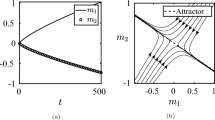Abstract
We consider the problem of allocating an amount of a perfectly divisible good among a group of n agents. We study how large a preference domain can be to allow for the existence of strategy-proof, symmetric and efficient allocation rules when the amount of the good is a variable. This question is qualified by an additional requirement that a domain should include a minimally rich domain. We first characterize the uniform rule (Bennasy in The economics of market disequilibrium, Academic, New York, 1982) as the unique strategy-proof, symmetric, and efficient rule on a minimally rich domain when the amount of the good is fixed. Then, exploiting this characterization, we establish the following: there is a unique maximal domain that includes a minimally rich domain and allows for the existence of strategy-proof, symmetric, and efficient rules when the amount of good is a variable. It is the single-plateaueddomain.
Similar content being viewed by others
References
Barberà S, Sonnenschein H, Zhou L (1991) Voting by committees. Econometrica 59:272–291
Bennasy JP (1982) The economics of market disequilibrium. Academic, New York
Berga D (1998) Strategy-proofness and single-plateaued preferences. Mathe Soc Sci 35:105–120
Berga D Serizawa S (2000) Maximal domain for strategy-proof rules with one public good. J Econ Theory 90:39–61
Border KC, Jordan JS (1983) Straightforward elections, unanimity and phantom voters. Rev Econ Stud 50:153–170
Ching S (1994) An alternative characterization of the uniform rule. Soc Choice Welf 11:131–135
Ching S, Serizawa S (1998) Maximal domain for the existence of strategy-proof rules. J Econ Theory 78:157–166
Ching S, Serizawa S (2003) Maximal and supremum domains for strategy-proofness. mimeo
Ehlers (2002) Coalitional strategy-proof house allocation. J Econ Theory 105:298–317
Gibbard A (1973) Manipulation of voting schemes: a general result. Econometrica 41:587–601
Massó J, Neme A (2001) Maximal domain of preferences in the division problem. Games Econ Behav 37:367–381
Massó J, Neme A (2004) A maximal domain of preferences for tops-only rules in the division problem. Soc Choice Welf 23:187–206
Moulin H (1984) Generalized Condorcet-winners for single peaked and single plateaued preferences. Soc Choice Welf 1:127–147
Satterthwaite M (1975) Strategy-proofness and Arrows conditions: existence and correspondence theorems for voting procedures and social welfare functions. J Econ Theory 10:187–217
Serizawa S (1995) Power of voters and domain of preferences where voting by committees is strategy-proof. J Econ Theory 67:599–608
Sönmez T (1994) Consistency, monotonicity, and the uniform rule. Econ Lett 46:229–235
Sprumont Y (1991) The division problem with single-peaked preferences: a characterization of the uniform allocation rule. Econometrica 59:509–519
Weymark J (1999) Sprumont’s characterization of the uniform rule when all single-peaked preferences are admissible. Rev Econ Des 4:389–393
Author information
Authors and Affiliations
Corresponding authors
Rights and permissions
About this article
Cite this article
Mizobuchi, H., Serizawa, S. Maximal Domain for Strategy-proof Rules in Allotment Economies. Soc Choice Welfare 27, 195–210 (2006). https://doi.org/10.1007/s00355-006-0112-4
Received:
Accepted:
Published:
Issue Date:
DOI: https://doi.org/10.1007/s00355-006-0112-4




